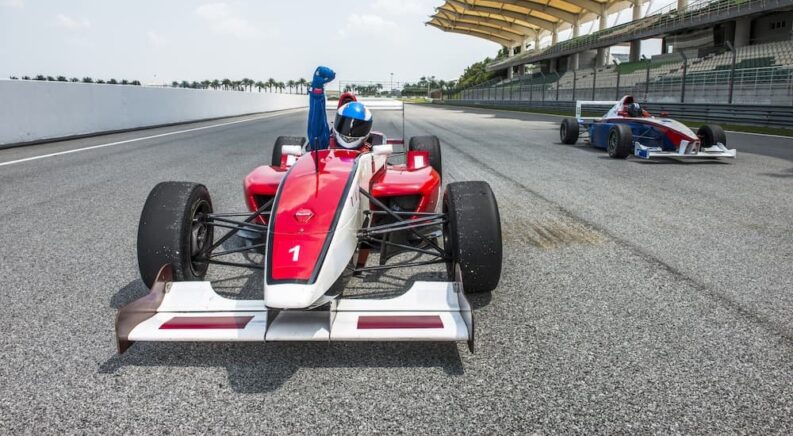Although it’s widely considered the most popular form of motorsports in the world, Formula 1 frequently finds itself mired in controversy. From spying allegations between McLaren and Ferrari in 2007 to accusations of drivers deliberately crashing their competition to win the championship (perhaps most notably when Michael Schumacher and Damon Hill collided in the 1994 season finale), a season seldom goes by without a major dispute.
The latest controversy involves one of the biggest names in motorsports. Michael Andretti, a multiple-time IndyCar champion as a driver and owner whose father Mario was the 1978 F1 World Champion, is attempting to enter the F1 owner ranks with a team backed by General Motors under the Cadillac nameplate. However, after initially indicating they would accept the bid, Formula 1 reversed course, telling Andretti and GM they would not be considered for entry until at least 2028.
The reaction has gone well beyond racing. The U.S. House Judiciary Committee began an official investigation in May 2024, and a bipartisan group of six U.S. senators has requested the Department of Justice (DOJ) and Federal Trade Commission (FTC) do the same. Why did F1 renege on their initial endorsement? Why has Congress gotten involved, and how is it they can do so? Where does the Andretti bid go from here? We’ll attempt to answer these questions and others as we await the next move.
Bid Revoked: A Recap of Andretti and F1
The first thing worth noting is that Michael Andretti and F1 controversy are nothing new. Andretti ran one F1 season as a driver in 1993 for McLaren, and the Andretti family has since claimed that McLaren and former F1 CEO Bernie Ecclestone combined to sabotage his efforts. Allegedly, the motivations were that McLaren wanted to replace him with test driver Mika Hakkinen (an eventual two-time F1 champion) at a much lower salary and that Ecclestone wanted to make IndyCar look bad, as Michael had won the 1991 CART championship.
Nevertheless, Andretti has been trying to get into F1 as an owner for years. He initially tried to buy the Force India team in 2018, which was eventually sold to Canadian billionaire Lawrence Stroll and rebranded as Aston Martin. In 2021, Andretti tried to buy a majority stake in the Sauber team. He claims he was within days of doing so until the owners presented him with “unacceptable” terms.
The GM-backed effort initiated in January 2023 is Andretti’s third try, and thus far, it has not been the charm. The start was promising, as Andretti claims F1 told them that if the Andretti team brought an original equipment manufacturer with them, they were all but assured entry. To this end, in November 2023, GM registered as an official F1 engine supplier beginning in 2028. The team also had to prepare a 600-page report explaining why they deserved to be admitted.
However, on January 31, 2024, F1 formally rejected their bid to have a team in either 2025 or 2026. F1 cited three factors for the rejection:
- They don’t believe the Andretti team will be competitive until GM and Cadillac finish developing an official F1 engine.
- Trying to assemble an F1 team in two years is a “unique technical challenge” that Andretti has not previously faced, which has made F1 skeptical of their ability to do so.
- Having the Andretti name does not add value to F1 as claimed. Rather, it is F1 that adds value to Andretti.
All About the Money?
There’s a saying that if you want to find the true culprit, follow the money, and the speculation is that money may be the real reason behind the Andretti F1 rejection. According to Andretti, backlash from the existing teams regarding the potential financial fallout is what put pressure on F1 to reject the bid. Red Bull team principal Christian Horner effectively confirmed this in a fall 2023 interview, saying shareholders were concerned about their teams being devalued by a new entry.
F1 already has protection against this in the form of a $200 million “anti-dilution fee” introduced in 2021 that any new team must pay, which is divided among existing teams. That may not be enough, though. In late May 2024, news broke that teams were demanding major changes to the Concorde Agreement—the contract that the teams, the Formula One Group, and the FIA sanctioning body all sign for operations—when the current deal expires following the 2025 season. Reports are that they want the anti-dilution fee raised to $600 million in 2026 and $700 million by 2028. They also want the rule restored that new teams can’t receive prize money in their first season.
Either or both stipulations would place an even more significant burden on Andretti Cadillac and any other new team that wants to enter F1. Coming up with $600-700 million on top of the costs for team development and hiring staff is a tall order. As such, F1 would have an even stiffer barrier of entry to keep it exclusive.
Why Is Congress Investigating?
As mentioned, one congressional investigation of the Andretti decision is already underway, and a potential second one is in the works. But how can Congress potentially have a say in F1 operations? In 2016, Formula 1 was purchased by Liberty Media Corporation, a Colorado-based conglomerate that is also the principal owner of Sirius XM Satellite Radio, among other ventures. This is undoubtedly a reason why F1 has stepped up its US presence in recent years, with three stateside events now on the calendar (Miami, Circuit of the Americas [Texas], and Las Vegas).
Consequently, this makes F1 subject to US laws and regulations, potentially including antitrust laws. This is what was behind the senatorial letter to the DOJ and FTC. According to a press release from US Senator Alex Padilla (D-CA), there is concern that “F1’s governance board may be illegally colluding with current F1 teams” to prevent Andretti from participating, in part because Andretti would be fielding an American car make in a European-dominated sport. In short, the current state of F1 may be too exclusive for the tastes of US lawmakers.
Is There More to the Rejection?
As if there wasn’t enough going on already, there may be a personal element to the story. In talking with NBC News in late May, Mario Andretti described a chat with F1 CEO Stefano Domenicali at a recent breakfast reception for the Miami race weekend. According to Mario, Liberty Media CEO Greg Maffei interrupted them to say, “Mario, I want to tell you that I will do everything in my power to see that Michael never enters Formula 1.”
Maffei wouldn’t comment on the allegation, and an anonymous source claimed Andretti’s version of the events was inaccurate. Even so, it’s a bad look for F1 and its ownership group. In my research, I could not find evidence of a past beef between Maffei and the Andrettis. For now, people can only speculate on why Maffei seems dead-set against Michael Andretti joining F1 and what influence he may have.
What’s Next for Andretti and F1?
Since Mario Andretti was invited to speak in Washington, DC in mid-May regarding the matter, there have been no updates regarding the Congressional investigation(s). However, Michael Andretti has already struck back. On May 21, 2024, Motorsport.com reported that Andretti was poaching F1 Chief Technical Officer (CTO) Pat Symonds to spearhead his team’s development. Symonds played a large role in developing the forthcoming 2026 rules package, and the move shows Andretti is committed to finding a way onto the F1 grid.
Still, there’s the matter of how. Some people have suggested that a current back-marker team such as Alpine sell its operations to Andretti, which would allow him to enter the sport sooner and without the massive anti-dilution fee. Audi has already taken this route, announcing in 2022 that it was buying the aforementioned Sauber team for a planned 2026 F1 entry.
In my opinion, though, the Congressional investigations are the key going forward. Historically, professional sports in the US and Europe have been exempt from antitrust laws. However, multiple antitrust rulings have been made against the NCAA. If it is found that F1 has engaged in anti-competitive practices as alleged, it could set a landmark precedent, not just for F1 but potentially for NASCAR and other North American sports leagues. I’ll be on the edge of my seat to see how this plays out and how it affects the sports landscape.






